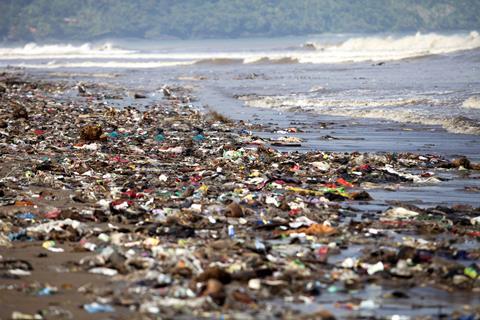
Every day, approximately 8 million pieces of plastic pollution find their way to the ocean with 320 million tons of plastic being produced in 2016 alone, and this amount is expected to double by 2034. It is estimated that 100,000 marine mammals and turtles and 1 million sea birds are killed annually by plastic pollution. Besides being deleterious to marine life, tiny particles of plastic debris known as microplastics taken up by fish and bivalves can be then be consumed by humans. Because they can take hundreds to thousands of years to decompose, microplastics pose a long-term physical and chemical hazard.
While there has been significant research into the impact of plastic waste on aquatic ecosystems, less is known about the pathways through which plastics are carried within estuaries to the coastal ocean and where they ultimately settle, if not left to float on the surface. Even if the particles settle they can again be resuspended through turbulence.
The goal of our project is to generate a detailed understanding of the fundamental mechanisms of microplastic transport, settling, and resuspension by currents, eddies, and waves. While the first year of WUN RDF supported research will bring the team together to exchange ideas, providing a focus to the team will be the medium-term goal of examining plastic transport from the St. Lawrence River in Canada to the Atlantic Ocean, a location chosen because of its proximity to the observational researchers on the team.
The long-term goal will be to extend this work to the study of highly polluted estuaries such as the Yangtze River. To this end, the team will establish the foundation for a global consortium of researchers who will formulate models for the pathways of plastic pollutants and examine their impact upon marine ecosystems and society.
Outcomes
While microplastics are becoming recognized as a pollutant, their evolution from source to sink and their distribution in marine environments remains poorly understood. As a result, it is difficult for politicians and economists to formulate well-informed policies. Likewise, fisheries and marine biologists struggle to assess the future impact of microplastics upon marine ecosystems.
The intent of our team is to provide a predictive tool for the distribution and concentration of microplastics deposited in sediments located in estuaries, the coastal oceans and the abyss. This is a five-year goal that can only come to fruition on such a time-scale through the catalyst of WUN funding that will bring the team together in order to build a well-funded collaborative research network. In the process, the team members will enhance their already productive research contributions through publications in high-impact journals.
Besides this main thrust, the intent of the team is to reach out to researchers in chemistry, marine biology and beyond in order to develop a co-ordinated international framework in which to examine the societal and ecological impacts of microplastic pollution. Such a rigorous and holistic approach is necessary to guide policymakers as well as to direct clean-up efforts.
Selected outcomes
In 2019
Additional funding has been received from Environmental Solutions Initiative (ESI) for a Workshop on Modelling Plastics in the Oceans.
Scholarly event
Workshop on Modelling Plastics in the Oceans, MIT, Boston, 6-8 Nov 2019, attended by 39 participants including WUN team members, academics from Brown University, Massachusetts University, MIT and Woods Hole Oceanographic Institution, as well as from industry and non-governmental orgs. 16 participants gave presentations within 4 breakout sessions.
Other
Exchange of postdoctoral fellow, David Deepwell (at WUN institution, University of Alberta, under supervision of Bruce Sutherland). Dr Deepwell worked with collaborator, Eckart Meiburg, at UC Santa Barbara to develop numerical tools to model particle transport in fluids. The exchange took place October 20 – November 5, 2019, immediately before the WUN-sponsored Workshop at which Dr Deepwell was in attendance.